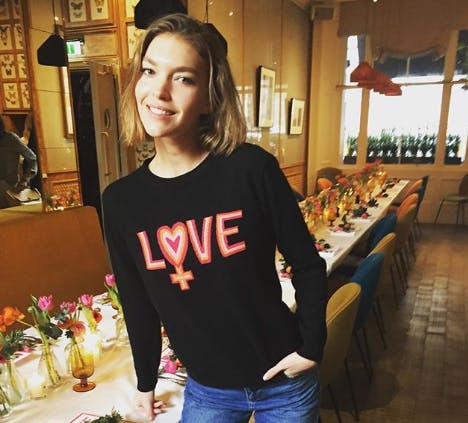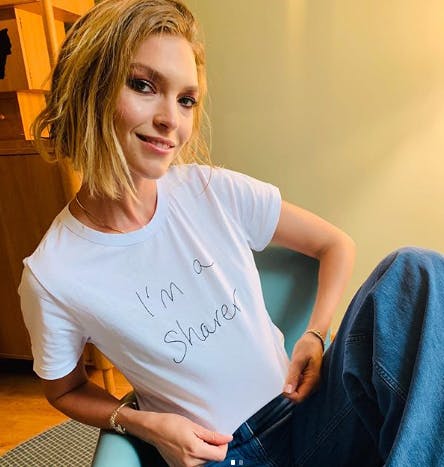Ten years ago, Arizona Muse made her big break in the fashion world. She was chosen by Prada to open and close the Italian luxury brand’s flagship show in Milan.
To continue reading, subscribe to Eco‑Business.
There's something for everyone. We offer a range of subscription plans.
- Access our stories and receive our Insights Weekly newsletter with the free EB Member plan.
- Unlock unlimited access to our content and archive with EB Circle.
- Publish your content with EB Premium.
Five years and innumerable shoots, catwalks and Vogue magazine covers later, the British-American model pivoted from the glamourous world of fashion towards the somewhat scruffier world of environmental activism.
“It dawned on me that I had no idea where the clothes I was working in came from, what they were made of, and who made them,” she told Eco-Business in a webinar at the Conscious Festival on Friday.
That epiphany prompted the Arizona-born ambassador for the likes of Burberry, Chanel and Dior to become an enthusiastic student of sustainability. “I went on a mission to find out as much as I could,” said Muse, who, five years on, is now a sustainability consultant to fashion brands as well as an activist and model.
In February, a month before the World Health Organisation declared a pandemic of the Covid-19 coronavirus and the United Kingdom, where Muse is based, went into lockdown, she fronted a campaign for climate movement Extinction Rebellion (XR).
“
I hope in the near future there will come a time when I can say, ‘I won’t work a brand unless it is sustainable’. But at the moment that is not realistic.
“The industry I love and represent is in crisis,” she said in a video for XR to encourage consumers to share, repair, rewear their clothing. “Every year, a hundred billion pieces of clothing are made, taking a terrible toll on the planet and the people who make them.”
“This happens because the people who buy them are unaware. But the industry knows, and things are not getting any better,” she said of an industry that produces 10 per cent of man-made carbon emissions, and is the second-largest consumer of the world’s water supply.
In this interview with Eco-Business, Muse talks about how she pressures fashion brands to reduce their environmental impact, and how to make climate change part of the Covid-19 conversation.
What prompted your shift towards environmental activism?
Five years into my career it dawned on me that I had no idea where the clothes I was working in came from, what they were made of, and who made them. That is where my sustainability journey began.

Arizona Muse celebrating Interational Women’s Day. Image: arizona_muse on Instagram
As anyone who has started out on their own sustainability journey will know, once you get started, you can’t stop. You start learning and it changes the way you think about the world. I went on a mission to find out as much as I could, and I came to realise how sustainability connects every single industry. For instance, fashion is totally intertwined with agriculture, with most materials being grown.
As well as endless research, I also took a course at Cambridge on sustainable business. Since then I have teamed up with groups like Fashion Revolution, who work to change the way clothes are sourced and consumed. I have worked as a sustainability consultant for a few brands. And, I am on the board of The Sustainable Angle, a non-profit organisation that drives projects that minimise the environmental impact of the fashion industry.
You’ve been a spokesperson for Extinction Rebellion, which encourages its supporters to break the law in protest against government inaction on climate change. Have you worried that supporting a group like XR would affect your modelling career?
Modelling has given me so much, not least a platform which I strive to use to make a positive impact on the future of the planet.
Because of my modelling I have direct access to designers and CEOs who are making decisions about their business. I take every opportunity to talk to them about the work they are doing, the changes they could and should adopt and the impact they could make.
It’s not always an easy balance to strike. But I am lucky. Twenty years ago, models who were also environmentalists had to stay quiet. No one was ready to listen to you. I live in a different era. The world has changed so much. It is now cool to want to protect the environment. While there are definitely jobs that I would not take, I don’t think it’s jeopardising my career at all. If anything, the industry wants to hear more from the sustainability people than ever before.
I think XR are doing an amazing job of putting this urgent issue on the public agenda, and I support anyone who is doing that. XR also offers people like me an opportunity to go out and feel like we are making a real impact on the world we want to live in.
People get it now—climate change is a thing. But we’ve waited until the last minute, which until recently made me angry. Scientists have been telling us about the degradation of ecosystems for the last 45 years. But I was recently talking to a farmer, who changed my perspective. He said, ‘It is true that we’ve waited until the last minute. But it’s also true that humans do their most efficient work in an emergency.’
How do we get big brands to be part of the sustainability conversation?
I think they are part of the conversation, from the fast fashion brands to the luxury brands. While everyone is trying to say the right thing, not enough are taking action. Some are doing great work, others have ambitious plans and a lot have a very long way to go.
Consumers are a lot savvier to gimmiky campaigns now. To avoid greenwashing, brands have to be able to take a proper look at themselves, own up to their shortcomings, manage expectations and invest in genuine improvement.
I’m not a big supporter of brands that have a sustainable collection and a regular collection. It would be more impactful if they made a proportion of their entire range sustainable. But that’s not as big a PR win for them as having a collection that is 100 per cent sustainable, which is easier to package and talk about.
As an industry, we need to focus on actual change not just talk about it.
To what extent do the leaders of the big fashion brands like Prada listen to you when you say the industry has got to change?
I have learned, to my surprise in some cases, that most brands want to change. Many just don’t know where or how to start.
The last time I was working with Prada was for a Fashion Week, where everything is incredibly chaotic and you don’t have a moment to say anything other than “Thank you for having me”. However, when I am on shoots, which are more relaxed, you get a lot more time to talk with the people who are making decisions. I have found, especially more recently, that people are really engaged, and they are definitely listening.
“
As an industry, we need to focus on actual change not just talk about it.
It’s taken a while to learn how to talk about environmental issues in an interesting way. Years ago, I would be at a dinner party talking to someone about sustainability, and after about a minute I’d notice them slowly turn away! I learned through trial and error how to not be boring [when talking about sustainability]. To me it’s interesting and it’s all I want to talk about, but that isn’t everyone’s truth.
So how do you engage people when you’re talking about sustainability?
Enthusiasm. It’s about how you share the information. When you talk about how it’s changed your life, and the enriching conversations you’ve had since you became interested in it, people respond.
Doesn’t the high impact and consumptionism of the fashion world jar with sustainability, and so affect the credibility of what you are telling people?
As I mentioned, there are a few brands that I wouldn’t work with. And, I hope in the near future there will come a time when I can say, ‘I won’t work a brand unless it is sustainable’. But at the moment that is not realistic because there are not enough sustainable brands. I also feel like I can have a big impact on those brands I work with who are just setting out in their sustainability journey.

“I’m a sharer”. Arizona Muse promoting the sharing economy. Image: arizona_muse on Instagram
If I couldn’t model and didn’t have this platform, then it would be a lot more difficult for me to have the kind of conversations that I am having with decision-makers at companies.I want to use that opportunity in the best way possible.
How do you drive the most impact with sustainability messages in social media?
Last November I turned my Instagram account [which has 263,000 followers] into a purely educational platform [previously it was fashion focused]. I did worry that my following wouldn’t like it, and that it would be boring. I was shy of sharing my passion about the environment. Previously, when I posted about something I cared about, I got far fewer ‘likes’; even a post about ocean health with a swim suit picture! But now that I’ve been honest about what I care about, I’m getting much more engagement. I’m enjoying Instagram more now. It used to be a chore.
On your Instagram page, you posted the quote, ‘Climate change needs to hire coronavirus’s publicist’. How do we steer the conversation back to climate?
The Covid-19 pandemic has managed to unite humanity in a way that nothing else has. The Black Lives Matter movement has become front and centre of everyone’s consciousness too, and that’s where it should be. I am of the mind that these issues are not separate from climate change—how we protect humanity’s health, the health of the environment, and ensure humans are treated equally should be part of the same conversation.
If I’ve learned one thing in the five years I’ve been an environmental activist it is that diversity and environmentalism are part of the same conversation [this is known as intersectional environmentalism]. People who are underprivileged are the ones who are paying the most for climate change.
How do you think Covid-19 is changing how people feel about the environment?
People are realising how much their families mean to them, and how much nature means to them. I’m hoping that when people go back to work, amid the throng of trying to revive the economy, people are not going to lose touch with those new-found connections.












